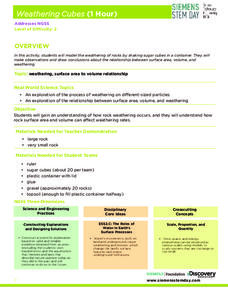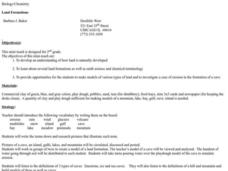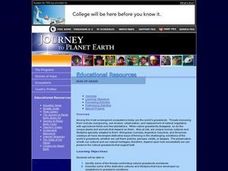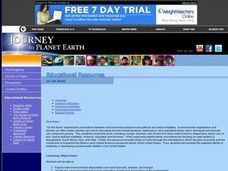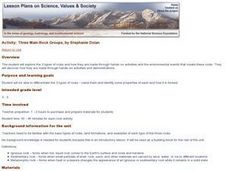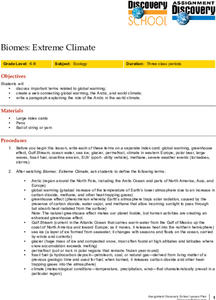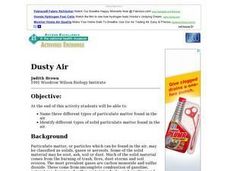Curated OER
Mud in the Water
Students build a soil erosion model to study the importance of soil conservation. They investigate how land forms from both constructive and destructive forces.
Curated OER
Ecological Impact of Wood Extraction
Students explore their local environment by conducting a class experiment. For this deforestation lesson, students discuss the effects of wood harvesting on forests around the world and research environment related vocabulary terms....
Curated OER
Rocks, Minerals, and Erosion
Fourth graders describe the difference between minerals (composed of the same substance throughout) and rocks (composed of two or more minerals). They recognize that there are three classes of rocks: igneous, sedimentary, and metamorphic
Curated OER
Erosion in Different Soils [Erosion Races]
Fourth graders review how erosion can happen by wind, water, and gravity which they studied in previous lesson. They attempt to discover if all soils erode at the same rate. In small groups, 4th graders experiment with three different...
Curated OER
Hold on Tight!
Students explore the close connection between plant roots and the soil in which they grow. They investigate the roots of plants, make models of plant roots using pipe cleaners, and examine photos and images to explore the connection...
Curated OER
Constructive and Destructive forces
Young scholars explore constructive and destructive forces. In this constructive and destructive forces lesson, students complete a WebQuest. Young scholars explore the different types of forces and their effect on the surrounding...
Curated OER
Hold on Tight!
Students explore the relationship between plant roots and the soil in which they grow. They examine photos of uprooted trees and desert areas and
conduct experiments designed to highlight this mutual relationship between roots and soil....
Discovery Education
Weathering Cubes
Weathering is not necessarily a result of the weather. Scholars conduct an experiment to explore the effect of surface area and volume on the weathering process. They create their own sugar cube rocks using the same number of cubes—but...
Curated OER
Land Formations
Second graders explore land formations. In this science lesson plan, 2nd graders develop an understanding of how land is naturally developed, investigate several land formations as well as earth science and chemical terminology, and ...
Curated OER
Weathering Landforms
Fifth graders brainstorm a list of ways the Earth's surface can change. As a class, they are introduced to the concepts of erosion and weathering and discover how wind and water cause changes to the surface of the Earth. To end the...
Curated OER
Effects Of Weathering
Third graders simulate weathering and erosion using sand and soil. They define weathering and the ways in which surfaces become weathered. Working as a class, 3rd graders complete various activities that demonstrate physical and...
Curated OER
Tide Pool Discovery
First graders visit the Discovery Pool, where they use their senses to investigate the different tide pool species. They touch different species. Students describe how each one feels, and what they look like in words. They draw the...
Curated OER
Protecting Our Planet
Young scholars examine the impact of pollution. For this pollution lesson, students watch Protecting Our Planet, then participate in a simulation of the effect of pollution on a variety of organisms.
Curated OER
Weather Lesson
Students examine the various types of dangerous weather situations. In groups, they focus on the characteristics of a nor'easter and how it forms. They compare and contrast the two main types of nor'easters and examine how one can use...
Curated OER
Seas of Grass
Students view a video clip about grasslands. They identify threats to grasslands and describe cultures which have adapted to grassland conditions. They discuss possible solutions to preserve grasslands as well.
Curated OER
On the Brink
Students view a film about environmental issues. They discover how environmental degradation can lead to disease. They identify the relationship between population growth and the environment.
Curated OER
Stream Ecology In Wisconsin and Puerto Rico
Students identify the different types of water and explain in what proportions they exist on Earth. They identify and correctly label the parts of the water cycle and how these parts interact with each other. Students identify the...
Curated OER
Processes of the Rock Cycle
Students explore, predict, and create each major rock form (sedimentary, metamorphic, and igneous) with colored modeling clay, discover cycle of rock formation, and examine important relationships of heat and pressure in rock development.
Curated OER
Three Main Rock Groups
Students are introduced to igneous, sedimentary and metamorphic rocks. They use foods to demonstrate the basic formation of each type of rock, read books about rock formation and view related videos.
Curated OER
Bhutan, the Last Shangri-La: Sandwich Squash: How the Himalayas Were Formed
Students create and record a model of mountain formation. They identify major mountain building formations. Students understand how the Himalaya Mountains were formed, why they are located near Bhutan, and why they are becoming larger.
Curated OER
THE FARMER CARES FOR THE LAND
Young scholars will identify cause and effect relationships in issues relating to Agriculture and the environment.Ask students to describe what farmers do. Then ask young scholars to define the word "environmentalist." Ask students if...
Curated OER
Biomes: Extreme Climate
Students create a web connecting global warming, the Arctic, and wold climate. They write a paragraph explaining the role of the Arctic in world climate.
Curated OER
THE TRICKLE DOWN EFFECT
Students participate in an exercise which demonstrates how sediments are deposited.
Curated OER
Dusty Air
Students discover the types and amounts of particulate matter found in the air. They collect particulates using a Petri dish coated with Vaseline then classify and count the collection under a stereoscope.
Other popular searches
- Wind Erosion and Deposition
- Preventing Wind Erosion
- Wind Erosion Grand Canyon
- Wind Erosion Diorama
- Wind Erosion Effects
- Wind Erosion Puzzle
- Waves Wind Erosion
- Wind Erosion Web Quest
- Wind Erosion Experiments
- Wind Erosion Webquest
- Erosion by Wind
- About Wind Erosion





![Erosion in Different Soils [Erosion Races] Lesson Plan Erosion in Different Soils [Erosion Races] Lesson Plan](http://content.lessonplanet.com/resources/thumbnails/140405/large/cgrmlwnvbnzlcnqymdezmdmyos01nde3lxfmmzy0dc5qcgc.jpg?1414240121)



